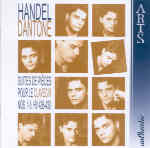Harpsichordist Ottavio Dantone responds well to the improvisatory and decorative aspects of Handel’s keyboard suites. Note the imagination and taste with which he realizes Suite No. 1’s loosely notated Prelude, as well as his stylish embellishments and ornaments lavished upon repeats. A vocal rather than instrumental sensibility determines how Dantone shapes Handel’s elaborate melody lines in slower movements like No. 4’s Sarabande and the opening Air of No. 3’s Variations. And No. 5’s famous “Harmonious Blacksmith” variations gather steady momentum in a relaxed manner with plenty of room to let the notes breathe.
Yet Dantone has his share of less convincing moments. His agogic adjustments in No. 4’s opening Fugue pull focus from the music’s natural flow, and other movements would have benefited from the firmer, shapelier left-hand underpinnings that characterize Blandine Verlet’s reference set (especially No. 2’s opening Adagio and subsequent Allegro). By contrast, Dantone jaunts through No. 1’s final Gigue at too fast a clip for dancing comfort. Arts Music provides fine engineering and excellent, scholarly booklet notes.
































